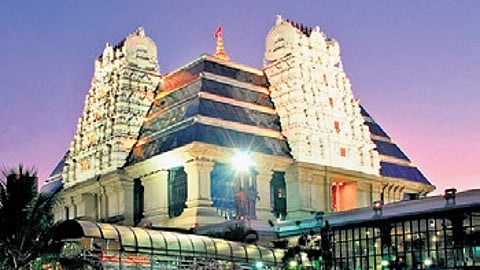Won ISKCON’s long fight for Prabhupada’s legacy, says temple president Madhu Pandit Dasa
BENGALURU: After the Supreme Court ordered that the famous Hare Krishna Hill temple in Rajajinagar belongs solely to the ISKCON-Bangalore Society and not to ISKCON-Mumbai, Sri Madhu Pandit Dasa, President of ISKCON-Bangalore, said the internal ISKCON battle was never just about property — it was a long fight to uphold the spiritual legacy of Srila Prabhupada, the founder acharya of ISKCON.
“They can no longer expel thousands of devotees who wish to accept only Srila Prabhupada as the sole acharya of ISKCON,” he said, reiterating that Prabhupada had set up a Ritvik system where all devotees would remain his disciples even after his passing.
The Supreme Court’s verdict on Friday marks the end of a 24-year legal and ideological battle between the ISKCON societies of Bengaluru and Mumbai. The apex court upheld ISKCON-Bangalore’s independent legal identity and confirmed that the temple land had been allotted to it by the Bangalore Development Authority (BDA) in 1988. The court also barred ISKCON-Mumbai from interfering in the administration or affairs of the Bangalore society.
What triggered the dispute was the question of spiritual succession within ISKCON after Srila Prabhupada’s Maha Samadhi in 1977. ISKCON-Bangalore has long opposed the idea of self-appointed successors or “gurus” leading the organisation. According to them, Srila Prabhupada had clearly outlined a Ritvik initiation system, under which he would remain the sole initiating spiritual master for all time, with representatives performing ceremonies on his behalf.
Following his death, however, several, mainly from Western countries, declared themselves as acharyas. This led to the formation of a parallel leadership structure and a growing rift within ISKCON globally. Madhu Pandit Dasa and his team resisted this change, insisting on preserving Srila Prabhupada’s original teachings and system.
Things escalated in 1999-2000 when ISKCON-Mumbai attempted to take control of the Hare Krishna Hill temple in Bengaluru, though the temple was built with funds raised locally and operated by the ISKCON-Bangalore society. What began as a spiritual disagreement turned into a prolonged legal struggle over control of the temple and the right to represent Srila Prabhupada’s legacy.
Madhu Pandit Dasa, who also heads The Akshaya Patra Foundation and the Global Hare Krishna Movement, said the verdict ensures that devotees can peacefully follow the path Srila Prabhupada laid down, without being forced to accept any other guru or authority in his place.
After Prabhupada’s death, dissenters to the new guru system across the world reportedly faced harassment, intimidation, and even violence. The most extreme case was the 1984 murder of Sulochana Das, an outspoken critic of the successor gurus. ISKCON-Bangalore claimed that their devotees, too, faced attempts of expulsion and marginalisation for not aligning with ISKCON-Mumbai’s leadership.

